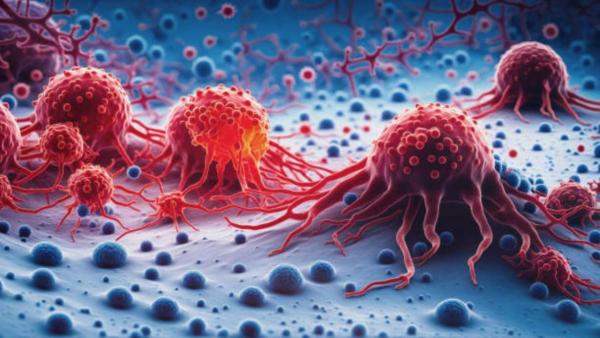
In a major leap toward safer cancer treatments, scientists at the Francis Crick Institute and Vividion Therapeutics have discovered a new compound that stops cancer cells from growing — without damaging healthy tissue.

The discovery targets one of cancer’s most notorious genes, RAS, which is mutated in around 20% of all cancers. Until now, treatments that block RAS often disrupted vital functions in healthy cells, leading to severe side effects.
Normally, the RAS gene acts like a cellular “on” switch, telling cells when to grow and divide. But when it mutates, RAS gets stuck in the “on” position — pushing cells to multiply uncontrollably and form tumors.
Completely shutting down RAS has been nearly impossible because it’s also essential for normal cell activity. The new compound offers a clever workaround: instead of silencing RAS entirely, it blocks RAS from connecting to another key enzyme called PI3K — one of the main drivers of tumor growth. The study was published in Science, one of the scientific journals.
Crucially, PI3K also regulates blood sugar through insulin, so fully blocking it can trigger dangerous side effects like hyperglycemia. The new compound avoids this by stopping only the harmful RAS-PI3K interaction, leaving PI3K’s other roles untouched.
In tests on mice with lung tumors driven by RAS mutations, the treatment halted tumor growth without causing any rise in blood sugar levels.
When combined with other drugs that act on related pathways, the results were even more impressive — producing stronger and longer-lasting tumor suppression.
The compound also worked against HER2-driven breast cancers, which use a similar pathway to fuel growth. This means the therapy could be effective across multiple cancer types, not just those linked to RAS mutations.
Following its success in animal models, the therapy has entered its first human clinical trial, testing both RAS- and HER2-mutated cancers. Researchers hope it will prove safe and effective, either alone or alongside existing cancer drugs.
Dr. Julian Downward, Principal Group Leader at the Francis Crick Institute, called the breakthrough “a culmination of years of effort to stop RAS without harming normal cells.”
“Our collaborative effort has overcome this challenge by targeting the PI3K and RAS interaction specifically,” said Downward. “It’s exciting to see these clinical trials starting — a true example of how chemistry and biology can work together to create better cancer treatments.”
Dr. Matt Patricelli, Chief Scientific Officer at Vividion Therapeutics, added:
“By designing molecules that stop RAS and PI3K from connecting, we’ve found a way to selectively block cancer growth while keeping healthy cell processes intact. It’s incredibly rewarding to see this science now progressing into the clinic.”
This breakthrough could represent a turning point in oncology — offering a precise, side-effect-free way to halt cancer growth. If successful in human trials, it may pave the way for a new generation of targeted therapies that treat cancer more safely and effectively than ever before.